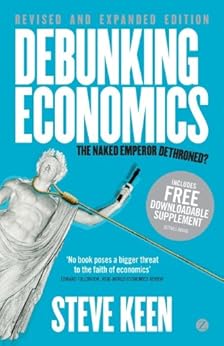 |
| Amazon link |
I'm only in the earliest stages of Steve Keen's critique of neoclassical economics (above). He's very successful in exposing their logical inconsistencies and utterly implausible assumptions.
From my own amateur reading of the standard texts, I recall authors conceding these points on the excuse that (i) we can learn something from pure models, and (ii) that despite the flawed assumptions the results seem surprisingly accurate.
I know that Dr Keen is underwhelmed by such hand-waving and will address those points in later chapters.
---
Keen is somewhat puzzled by the fact that leading economics journals won't see the force of his (undoubtedly correct) arguments or publish his erudite papers. He has some explanations in terms of cultural inertia, the apparent successes in the past of the neoclassical programme and even the usual lack of real-world consequences of getting the foundations so very wrong. He admits wryly that economics just isn't like physics or engineering.
This seems to me the crux of it:
- People will believe all kinds of things if doing so underpins their self-interest.
- If there are no practical consequences (ie nothing that can't be explained away), mere argument will never gain traction.
- If you believe humans will never fly (“if God wanted man to fly he would have given him wings”) then only an aeroplane will refute you.
I'm waiting for the final chapters where Keen unveils his alternative macroeconomic model which, I believe, successfully outperforms those of the neoliberals.
---
Remember those stories of how racist AI systems were categorising criminals by their mug shots? Plainly, said liberals, crime was a matter of unfortunate circumstances. How could faces (which identical twins suggest are genetically shaped) have anything to do with it?
Yet it was engineering - hard to argue against.
The Economist (liberal susceptibilities very much on hold) reports today: "Advances in AI are used to spot signs of sexuality".
"When shown one photo each of a gay and straight man, both chosen at random, the model distinguished between them correctly 81% of the time.Sexual orientation not so much a lifestyle choice after all.
When shown five photos of each man, it attributed sexuality correctly 91% of the time.
The model performed worse with women, telling gay and straight apart with 71% accuracy after looking at one photo, and 83% accuracy after five. In both cases the level of performance far outstrips human ability to make this distinction.
Using the same images, people could tell gay from straight 61% of the time for men, and 54% of the time for women. This aligns with research which suggests humans can determine sexuality from faces at only just better than chance."
Keen is not the only economist debunking the "Economic Standard Model" though. I dont know about his model yet, but there is a convergence of arguments in books I have read about the flaws in the standard model (I have just read a Stiglitz and might read more). There is also various forms of "Agent Based" Economic theories, which are rather computer model based, but interesting.
ReplyDeleteKeen has a chapter where he dissects a number of schools of 'heterodox economists'. And another where he mechanistically mangles Marx.
Delete